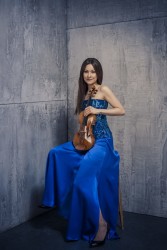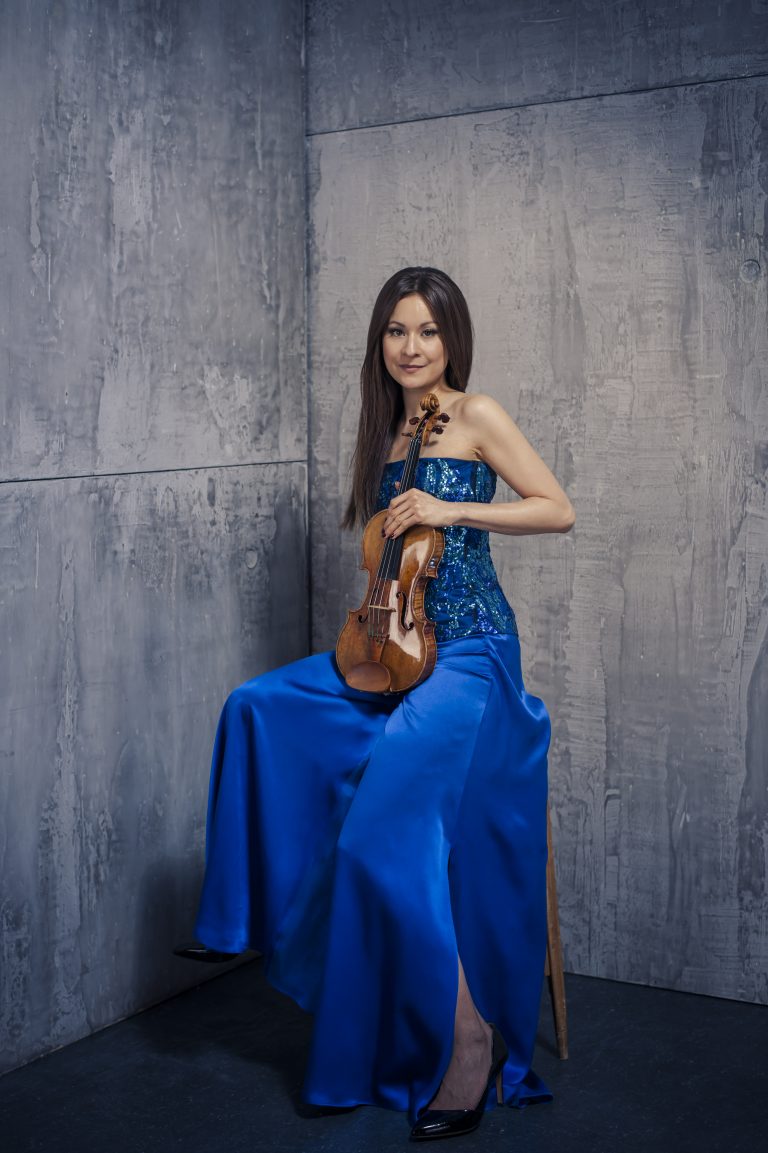Interview with Arabella Steinbacher

When I spoke with Arabella Steinbacher, she was half way through a tour with the Orchestre National de Lille in Southern France playing the Tchaikovsky Violin Concerto and conductor Mark Shanahan. The bitterly cold weather allowed the German violinist some extra time in her hotel to speak with me about her early career and her inspirations for what has been a busy calling embracing the standard classical repertoire and explorations of less known 20th century repertoire. Her impressive repertoire includes concertos by Barber, Berg, Glazunov, Hindemith, Khachaturian, Milhaud, Britten, Szymanowski, Prokofiev, Shostakovich, Hartmann, Stravinsky, and Schnittke. Arabella came to attain celebrity status when she stepped at late notice for an ill musician to perform the Beethoven Concerto in Paris with Sir Neville Marriner in 2004. Previously, she had already attained success on the violin competition circuit winning the Joseph-Joachim-Violinwettbewerbes Hannover when she was 19 and the Förderpreis des Freistaates Bayern. In 2008, The Strad wrote that ‘she seems to straddle the two most influential playing styles of the second half of the twentieth century. On the one hand, she possesses the outsize bravado flair, staccato resonance and ringing, tonal-centred opulence […] and the other, she plays with enhanced lower dynamic range, exquisitely floated bow strokes, and micro-fine interpretative detailing from such maverick individualists as Gideon Kremer and Thomas Zehetmair.’
GT: Arabella, you studied with a German teacher who had studied the Suzuki technique in Japan, then later when you were studying with Anna Chumachenco at the Munich Institute. Did this blend of styles have an effect on the way you play?
AS: I learned very early from the old style of my teacher, and that the most important thing was to study without the music in front of me, my study was better to learn it by heart from an early age. When I met Anna Chumachenco at the age of eight, it was a completely new stage in my learning, she had so much expectation of me, and she began by giving me the Mendelssohn concerto, and then the Mozart concertos, these are always the most difficult for every musician.
GT: You met with Ivry Gitlis, with Yehudi Menuhin and later with Anne-Sophie Mutter, which of these great violinists influenced you most of all?
AS: They didn’t teach me, but they inspired me, I went to Paris at the age of 19 to see Ivry Gitlis, and he listened to me play and I listened to his extraordinary way of playing, unlike anyone else, and I heard all his stories which were so interesting, he is so different from anybody else, his style was so completely different. I met Menuhin who inspired me too, as did Mutter who took me into her foundation and helped with the most important thing in my career by getting an agent and acquainting me with conductors.
GT: Do you ever listen to recordings of other violinists when you start studying a new piece?
AS: I don’t listen to other musicians’ recordings, I prefer to go to a concert or recital to hear other violinists if I am in a town and there is a concert. Only old recordings of a violinist or pianist or conductor, when I learn a new piece it was my father who was a répétiteur and he helped me learn a new piece, but since he died ten years ago I have been lucky to find a very good pianist and conductor with whom I now work on a new piece. Of course, I sometimes listen to old recordings, but the style of playing has changed so much since they were made, and we play so differently now!
GT: You have recorded some of the greatest concertos together with some 20th century concertos which are not so often heard today, which of these did you find of greatest interest?
AS: Concertos I adore, they are my passion, I learned Mozart and Schubert at an early age, but suddenly at the age of eleven at a summer music camp I found the Khachaturian Concerto when I heard somebody playing it, and I just fell in love with its fire and passion and I told my teacher Anna Chumachenco that I wanted to play this concerto and she introduced me to other music from this period, especially to Shostakovich, and Prokofiev. When I got a record company I told them wanted to record it when played with the CBSO under Sakari Oramo in Birmingham live in concert., later I discovered the Britten, Shostakovich, and Prokofiev concertos. Fabio Luisi heard me playing in Munich and suggested the Hindemith Violin Concerto to me, so I looked at it and I really fell in love with it, as I did later with the Britten concerto, all of these pieces were my idea to make recordings and the idea to record the Mendelssohn, Mozart and Tchaikovsky concertos actually came from the record company. I said to them who needs another Tchaikovsky concerto, but they said they are so popular, so we did them!
GT: Arabella, both of your parents were singers, your father was a concertmaster at the Munich opera, was this feeling for the human voice significant in your career?
AS: Music was a big part in our life at home, we were all having a nice time in my family playing and listening to music at home with people visiting over dinner, we had the wonderful feeling for music, at first it was so easy for me, but of course it is a very disciplined artform, but I have always loved the sense for the breathing and phrasing in music. I went to opera and to recitals, my mom wasn’t a singer, but she loved singing, and my dad had a great love for the music of Richard Strauss, so that is why I was called Arabella, I am glad because it is much better than being called Salome!
GT: In your concerts, you almost always play with your eyes closed as if you don’t want to see your audience. Why is this?
AS: For me, it is important to feel the energy around me and I find the eyes of people distracting, I can see that people taking their seats late, and I prefer to close my eyes and feel the energy of the players around me.
GT: You have worked with many distinguished conductors; do you have any favourites among them?
AS: Oh, that’s a dangerous question! I must be careful whom I mention and don’t mention. I am frightened to miss someone out! Certainly, I am indebted to Marek Janowski, Christoph von Dohnányi, Charles Dutoit, Herbert Blomstedt, Lawrence Foster, the old school of conductors, and especially to Neville Marriner who gave me so much support and help at an important Paris concert early in my career.
GT: What new pieces are you working on in the next year?
AS: I am constantly looking for new works, but sometimes it is so difficult to get conductors or promoters to take on new music. For instance, I am trying to play the Hindemith concerto more often, but it’s very difficult to get concerts performed of an unfamiliar concerto today. I am always trying my best to get new music played in my concerts.
In May 2018, Arabella Steinbacher tours with the Dresden Philharmonic and Michael Sanderling throughout the United Kingdom. For more information click here and for details of her concert at Edinburgh’s Usher Hall click here.
